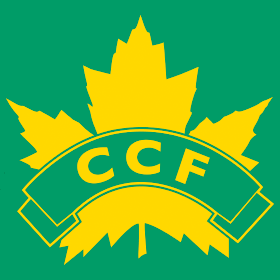
The Co-operative Commonwealth Federation was a federal democratic socialist and social-democratic political party in Canada. The CCF was founded in 1932 in Calgary, Alberta, by a number of socialist, agrarian, co-operative, and labour groups, and the League for Social Reconstruction. In 1944, the CCF formed one of the first social-democratic governments in North America when it was elected to form the provincial government in Saskatchewan.
The Progressive Party of Canada, formally the National Progressive Party, was a federal-level political party in Canada in the 1920s until 1930. It was linked with the provincial United Farmers parties in several provinces, and it spawned the Progressive Party of Saskatchewan, and the Progressive Party of Manitoba, which formed the government of that province. The Progressive Party was part of the farmers' political movement that included federal and provincial Progressive and United Farmers' parties.
The Saskatchewan New Democratic Party (NDP) is a social democratic political party in Saskatchewan, Canada. While the party is affiliated with its federal New Democratic Party, the party is considered to be a "distinctly homegrown" party given the role of the province in its development and the party's history in the province.
There have been various groups in Canada that have nominated candidates under the label Labour Party or Independent Labour Party, or other variations from the 1870s until the 1960s. These were usually local or provincial groups using the Labour Party or Independent Labour Party name, backed by local labour councils made up of many union locals in a particular city, or individual trade unions. There was an attempt to create a national Canadian Labour Party in the late 1910s and in the 1920s, but these were only partly successful.
Unity, United Progressive Movement and United Reform were the names used in Canada by a popular front party initiated by the Communist Party of Canada in the late 1930s.

The United Farmers of Alberta (UFA) is an association of Alberta farmers that has served different roles in its 100-year history – as a lobby group, a successful political party, and as a farm-supply retail chain. As a political party, it formed the government of Alberta from 1921 to 1935.
Sidney Green is a retired politician in Manitoba, Canada. He twice ran for the leadership of the New Democratic Party of Manitoba, served in the cabinet of Premier Edward Schreyer, and later formed the Progressive Party of Manitoba.
Aimé Raleigh (Pete) Adam was a politician in Manitoba, Canada. He served as a New Democratic member of the Legislative Assembly of Manitoba from 1971 to 1986, and was a cabinet minister in the government of Howard Pawley.
Peter Burtniak was a politician in Manitoba, Canada. He was a New Democratic member of the Legislative Assembly of Manitoba from 1969 to 1977, and served as a cabinet minister in the government of Edward Schreyer.

Socialism in Canada has a long history and along with conservatism and liberalism is a political force in Canada.
The Politics of Saskatchewan relate to the Canadian federal political system, along with the other Canadian provinces. Saskatchewan has a lieutenant-governor, who is the representative of the Crown in right of Saskatchewan; a premier—currently Scott Moe—leading the cabinet; and a legislative assembly. As of the most recent provincial election in 2020, the province is divided into 61 electoral districts, each of which elects a representative to the legislature, who becomes their member, or MLA. In 2020, Moe's Saskatchewan Party was elected to a majority government. Regina is the provincial capital.
Lily Schreyer, is a former Viceregal consort of Canada, as the wife of former Manitoba premier and Governor General Edward Schreyer. They married June 30, 1960 and had two daughters, Lisa and Karmel, and two sons, Jason and Toban. She has been involved with Girl Guides of Canada, UNICEF and other charitable organizations. She and her husband were made Companions of the Order of Canada in 1979.

Joseph William Burton (1892–1960) was a Canadian politician and farmer.

George Hara Williams was a Canadian farmer activist and politician.
The Progressive Party of Saskatchewan was a provincial section of the Progressive Party of Canada and was active from the 1920s to the mid-1930s. The Progressives were an agrarian, social democratic political movement. It was originally dedicated to political and economic reform; it also challenged economic policies that favoured the financial and industrial interests in Central Canada over agrarian interests. Like its federal counterpart it favoured free trade over protectionism.
Herman Henry Kemper (1882-1964) was an American-born farmer and political figure in Saskatchewan. He represented Gull Lake in the Legislative Assembly of Saskatchewan from 1934 to 1938.
Anton Bernard Weselak was a Canadian lawyer and politician. Weselak was a Liberal party member of the House of Commons of Canada. He was born in Beausejour, Manitoba and became a lawyer after studies at the Manitoba Law School.
John James "J.J." Smith was a Liberal party member of the House of Commons of Canada. Born in Storthoaks, Saskatchewan, Canada, he was educated at Fertile, Saskatchewan and became a farmer by career.
Tom Johnston was an English-born farmer and political figure in Saskatchewan, Canada. He represented Touchwood in the Legislative Assembly of Saskatchewan from 1938 to 1956 as a member of the Co-operative Commonwealth Federation.
Jacob "Jake" Benson was an English-born farmer and politician in Saskatchewan. He represented Last Mountain in the Legislative Assembly of Saskatchewan from 1929 to 1934 as a Progressive Party member and from 1938 to 1952 as a Co-operative Commonwealth Federation (CCF) member.





